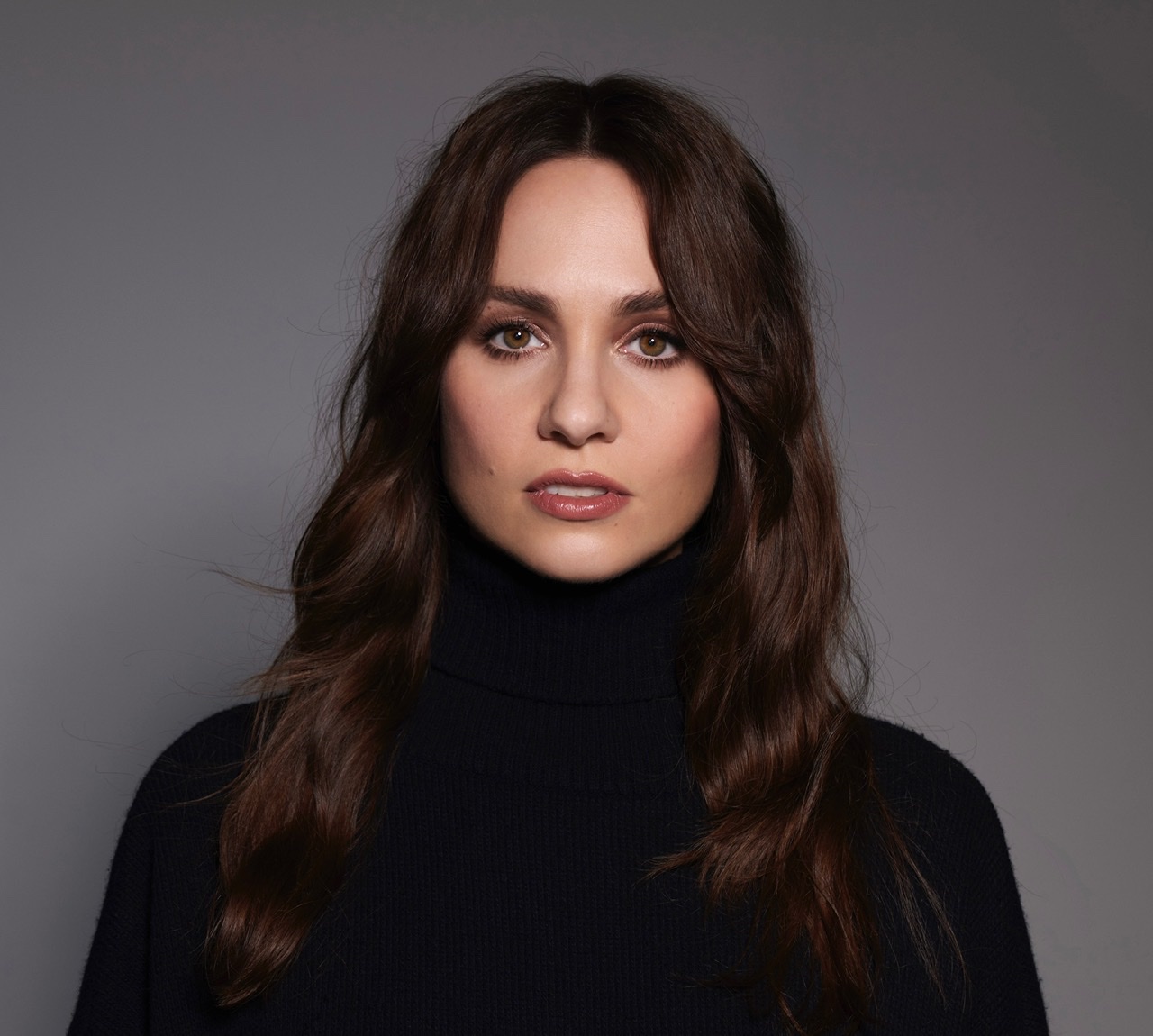Tuppence Middleton: Versatility and Emotional Depth in British Drama
Tuppence Middleton has established herself as one of Britain’s most compelling and versatile screen actresses, moving fluidly between period dramas, science fiction, and psychological thrillers while consistently delivering performances of remarkable emotional depth. At 37, the British actress has built an impressive career spanning television, film, and theater, earning particular recognition for her ability to convey complex inner lives through subtle, nuanced performances that resist easy categorization or typecasting.
Early Life and Education in Somerset
Born in Bristol, England in 1987 and raised in the coastal town of Clevedon, Somerset, Middleton grew up in an environment far removed from the entertainment industry. Her unusual first name—a family nickname that became her legal name—would later prove memorable in a competitive industry, though Middleton herself has occasionally acknowledged its peculiarity with characteristic self-deprecation.
“My name has been both a blessing and a curse,” she told The Independent. “People tend to remember it, which is useful in this profession, but I’ve spent my life explaining that yes, it’s my actual name, and no, my parents weren’t being cruel—it’s a family name that just stuck.”
Despite the confidence she now projects on screen, Middleton has described herself as an intensely shy child who found her voice through performance. School teachers recognized that her natural reticence masked a keen observational intelligence and suggested drama as a way to channel her sensitivity into expression rather than withdrawal.
“I was painfully shy growing up,” Middleton shared with The Telegraph. “Acting was suggested to me not as a career path initially, but almost therapeutically—a way to step outside myself and find confidence through becoming someone else. What began as a way to overcome anxiety eventually revealed itself as my greatest passion.”
This early experience with performance as a means of managing personal challenges would later inform Middleton’s approach to complex roles and her advocacy work around mental health issues.
Her formal education at Bristol Grammar School provided a strong academic foundation, while her subsequent training at Arts Educational Schools London—where she graduated with honors—gave her the technical skills that would later distinguish her screen performances. Colleagues and directors who have worked with Middleton consistently mention her technical precision, particularly her ability to modulate performances for different camera setups without losing emotional authenticity.
“Drama school taught me that technique and emotion aren’t opposing forces,” Middleton explained in an interview with The Stage. “Having solid technical foundations—understanding camera positions, how to use your voice effectively, how to repeat performances consistently across multiple takes—actually frees you to be more emotionally present because you’re not worrying about the mechanics.”
Early Career: British Television and Independent Film
Middleton’s professional journey began with appearances in British television dramas and modest film roles that, while limited in scope, allowed her to develop screen presence and technical confidence. Early projects included guest roles in series like Bones and New Tricks, though these offered little indication of the emotional range she would later display.
A more significant early opportunity came with the 2009 British horror film Tormented, where Middleton played a popular but cruel student whose bullying actions have supernatural consequences. While the film received mixed reviews, Middleton’s performance stood out for bringing unexpected depth to what could have been a one-dimensional “mean girl” role.
During this formative period, Middleton demonstrated a willingness to take risks and avoid easy categorization—a pattern that would continue throughout her career. Rather than pursuing a conventional trajectory of increasingly prominent romantic lead roles, she gravitated toward complex, often troubled characters in projects that emphasized psychological depth over commercial considerations.
“I’ve never been particularly strategic about career planning,” Middleton admitted to The Guardian. “I respond to characters who feel psychologically truthful, who have interesting internal conflicts or unusual perspectives. That’s led me down some unexpected paths, but I think it’s kept my work interesting and allowed me to develop in ways I might not have if I’d pursued more obvious choices.”
This approach led to supporting roles in BBC period dramas and independent British films where Middleton began to develop a reputation for bringing emotional complexity to even limited screen time. Casting directors and filmmakers noted her ability to suggest complex inner lives behind composed exteriors—a quality that would become her signature in later, more prominent roles.
Critical Recognition and Expanding Opportunities
Middleton’s career gained momentum with a series of supporting roles in acclaimed British productions, including the adaptation of Charles Dickens’ Great Expectations (2012), where she portrayed the complex character of Estella. Her performance captured the character’s practiced coldness while suggesting the emotional damage beneath—exactly the kind of layered portrayal that would become Middleton’s specialty.
“What makes Tuppence so compelling to watch is that her characters always seem to have secrets,” observed a director who worked with her during this period. “Even in scenes where she’s saying very little, you sense an entire inner monologue happening behind her eyes. That quality makes her perfect for adaptations of complex literary works where so much of the character development happens internally on the page.”
This capacity for suggesting psychological depth made Middleton increasingly sought after for sophisticated dramatic projects. In the 2013 British psychological thriller Trap for Cinderella, she took on dual roles in a complex narrative about identity and memory, showcasing her range by essentially playing against herself. Critics noted her ability to create two distinct characters whose similarities were environmental rather than inherent—a technical challenge that Middleton handled with remarkable subtlety.
These performances in British productions brought Middleton to wider industry attention, leading to supporting roles in higher-profile projects that would significantly expand her international visibility.
Transition to International Productions
Middleton’s transition to more prominent international productions began with supporting roles in major films like The Imitation Game (2014), where she played Helen, a colleague of Benedict Cumberbatch’s Alan Turing at Bletchley Park. Though not a leading role, her performance contributed to the film’s exploration of the social dynamics in this high-pressure wartime environment.
This was followed by a small but memorable role in the Wachowskis’ science fiction epic Jupiter Ascending (2015), which, despite mixed critical reception, introduced Middleton to the filmmakers who would later cast her in one of her most significant roles.
What distinguished Middleton during this transitional period was her ability to move between prestigious historical dramas and more experimental genre projects without compromising her commitment to psychological complexity. Unlike many actors who establish themselves in either commercial or independent cinema, Middleton demonstrated unusual versatility, approaching each project with the same attention to character development regardless of genre or budget.
“I’ve never really understood the supposed division between ‘serious’ drama and genre work,” Middleton told SFX Magazine. “Science fiction and fantasy can explore human psychology and social dynamics just as effectively as realistic dramas, often with more freedom to push boundaries. The emotional truth of the character remains the most important element regardless of whether I’m in period costume or portraying someone in a futuristic setting.”
This philosophical approach to performance across genres would prove particularly valuable in her next major role, which would bring her international recognition while showcasing her emotional range.
Breakthrough Role: Riley Blue in Sense8
Middleton achieved her most significant international recognition as Riley Blue in the Wachowskis’ ambitious Netflix series Sense8 (2015-2018). As an Icelandic DJ connected psychically to seven other individuals around the world, the role required Middleton to portray both individual trauma and the experience of shared consciousness—a complex acting challenge that she met with remarkable nuance.
Riley’s character arc involved processing profound grief while discovering her role within the cluster of psychically connected individuals. Middleton brought extraordinary emotional vulnerability to Riley’s trauma narrative while maintaining the character’s core resilience—a balance that made Riley one of the series’ most relatable and emotionally affecting characters despite the show’s fantastical premise.
“Sense8 was unlike anything I’d worked on before,” Middleton reflected in an interview with Collider. “Beyond the logistical challenges of filming across multiple countries with an enormous cast, there was the conceptual challenge of portraying shared consciousness—showing how Riley remains herself while experiencing the thoughts and emotions of seven other people. That required a very specific kind of performance where you’re simultaneously your character and a vessel for others.”
The global production schedule of Sense8 also provided Middleton with experience working across different international filming environments, from Reykjavík to Seoul, expanding her professional repertoire while exposing her to diverse filmmaking approaches.
Critics and viewers particularly responded to the authenticity Middleton brought to Riley’s emotional journey through grief, addiction, and recovery. Her portrayal of trauma and healing resonated deeply with fans, many of whom cited Riley’s story as the emotional core of the series despite its expansive, multi-protagonist structure.
“What Tuppence achieved with Riley was remarkable,” the Wachowskis noted in a press release following the show’s conclusion. “She had to convey both devastating personal tragedy and this transcendent connection to others, often in the same moment. The whole concept of sensates sharing consciousness only works if the audience believes in that emotional connection, and Tuppence’s performance was essential to making that central concept credible.”
Though Sense8 was ultimately canceled after two seasons (with a special finale episode commissioned due to fan demand), the series significantly raised Middleton’s international profile and demonstrated her ability to carry complex emotional narratives in unconventional settings—qualities that would inform her subsequent role selections.
Period Drama and Literary Adaptations
Following Sense8, Middleton returned to British period drama with notable roles that showcased her ability to bring contemporary emotional understanding to historical contexts. Her appearance in the 2018 adaptation of War & Peace as Hélène Kuragina demonstrated her facility with complex literary characters, bringing nuance to a character often reduced to simple villainy in previous adaptations.
Perhaps most significantly for her career visibility, Middleton joined the cast of the Downton Abbey film (2019) as Lucy Smith, a lady’s maid with a secret connection to the aristocratic Bagshaw family. She reprised the role in the sequel Downton Abbey: A New Era (2022), with her character’s journey reflecting the changing social dynamics of interwar Britain.
What distinguished Middleton’s performances in these period productions was her ability to suggest modern psychological complexity without anachronism—making historical characters feel fully human without imposing contemporary values or sensibilities that would compromise historical authenticity.
“Period dramas present a specific challenge,” Middleton explained to Radio Times. “You have to honor the social context and constraints of the era while finding the universal human experiences within those constraints. The language may be different, the social rules unrecognizable to modern viewers, but the core emotions—love, fear, ambition, insecurity—remain consistent across time. Finding that emotional truth within historical accuracy is the key to making period characters feel alive rather than like museum pieces.”
This balance between historical fidelity and emotional accessibility has made Middleton particularly valuable in literary adaptations and historical dramas aimed at contemporary audiences, allowing viewers to connect with distant historical periods through characters who feel psychologically recognizable despite their unfamiliar social contexts.
Artistic Approach and Performance Style
Colleagues who have worked with Middleton consistently mention her methodical preparation and emotional precision. Directors note her ability to suggest complex inner lives through minimal external expression—a restraint that makes her rare emotional outbursts particularly powerful when they occur.
“Tuppence has this extraordinary ability to inhabit stillness,” observed a cinematographer who worked with her on multiple projects. “Many actors feel they need to constantly be ‘doing’ something on camera, but Tuppence understands that the camera catches everything—a flicker of the eyes, a barely perceptible change in breathing pattern. She knows exactly how much is needed to convey complex emotions without overplaying, which makes her perfect for close-up-heavy emotional work.”
This controlled performance style has made Middleton particularly effective in projects that rely on sustained tension or gradually revealed character depths. Rather than telegraphing emotional states, she often withholds full emotional disclosure until precisely the right dramatic moment—a technique that creates particularly satisfying character arcs over the course of a series or film.
“I’m fascinated by what people don’t say, by the gap between interior experience and external presentation,” Middleton told Film Comment. “Most of us move through the world showing carefully edited versions of ourselves, revealing our true thoughts and feelings selectively. That tension between public self and private reality is where the most interesting character work happens for me.”
This interest in psychological complexity has led Middleton to roles that often involve secrets, hidden traumas, or complex motivations concealed beneath composed exteriors—exactly the kind of multidimensional characters that benefit from her subtle approach to emotional revelation.
Mental Health Advocacy
Beyond her acting work, Middleton has emerged as a thoughtful advocate for mental health awareness, speaking openly about her own experiences with obsessive-compulsive disorder (OCD) and anxiety. Rather than treating these discussions as peripheral to her professional identity, she has integrated them into her public persona, using her platform to destigmatize conversations about mental health challenges.
“For years, I viewed my OCD as something to hide, something separate from my ‘real’ life,” Middleton shared in a Mental Health Foundation interview. “But eventually I realized that understanding my own mental health has actually enhanced my ability to understand characters—particularly those who are struggling with their own internal conflicts or hiding aspects of themselves from the world. There’s a direct connection between the personal work I’ve done to manage anxiety and my capacity to portray complex emotional states authentically on screen.”
Middleton’s advocacy work has focused particularly on access to therapy and treatment, emphasizing that mental health support should be available across socioeconomic backgrounds rather than being a luxury for the privileged. She has participated in campaigns promoting both traditional therapeutic approaches and complementary practices like meditation that have helped in her own management of anxiety.
What distinguishes Middleton’s approach to mental health advocacy is her emphasis on the ongoing nature of mental wellness rather than presenting herself as “cured” or entirely beyond her challenges. This nuanced perspective has resonated particularly strongly with fans who appreciate her authenticity and refusal to present an unrealistically perfect public image.
“Mental health isn’t a binary state where you’re either ‘well’ or ‘unwell,'” she explained in a podcast interview. “It’s a continuum that requires ongoing awareness and different levels of active management at different times. Sharing that reality feels more honest and ultimately more helpful than presenting some miraculous recovery narrative that doesn’t reflect most people’s actual experience.”
Personal Life and Professional Boundaries
Despite her openness about mental health, Middleton maintains careful boundaries around other aspects of her personal life. While not secretive, she has established a separation between her professional and private worlds that allows her to maintain normalcy away from public scrutiny.
Friends and colleagues describe Middleton as thoughtful and private rather than reclusive—someone who values meaningful personal connections and time away from industry events. This approach to celebrity has created a sustainable relationship with public attention that prioritizes wellbeing over visibility.
“I’ve never been particularly comfortable with the more public-facing aspects of this profession,” Middleton admitted in a rare personal interview. “The work itself—the exploration of character, the collaborative process of filmmaking—that’s what I’m passionate about. The rest—red carpets, interviews, social media—I approach as part of the job, but it’s not where I find fulfillment.”
This perspective has allowed Middleton to build a career based on artistic quality rather than public profile, selecting projects based on creative interest rather than potential publicity value—a sustainable approach that has likely contributed to the consistent quality of her work across diverse projects.
Career Legacy and Future Directions
At 37, Tuppence Middleton has established herself as an actress of remarkable versatility and emotional depth, with a body of work that spans genres while maintaining consistent psychological complexity. Unlike performers who become associated with a single character type or genre, Middleton has built a career defined by thoughtful role selection and nuanced performances across dramatic contexts.
Industry observers note that Middleton’s career trajectory reflects a particularly British approach to screen acting—prioritizing craft and versatility over celebrity and specializing in characters with rich inner lives that may not be immediately apparent from external presentation. This tradition, exemplified by actors like Kristin Scott Thomas and Emily Watson, positions psychological truth above image or type, allowing for sustainable careers built on artistic quality rather than fleeting notoriety.
“What makes Tuppence such a valuable performer is her emotional intelligence,” observed a casting director who has worked with her multiple times. “She brings this extraordinary depth to characters who might seem unremarkable on the page. That ability to suggest complex interior lives makes her perfect for literary adaptations and psychologically nuanced projects where so much of the character development happens internally.”
Looking ahead, industry sources suggest Middleton may be exploring opportunities to work with female directors on projects centered on complex women’s experiences—an interest that aligns with broader industry movements toward more diverse perspectives behind the camera.
There are also indications that Middleton is interested in producing projects that align with her interests in psychological complexity and mental health themes, potentially allowing her greater creative control over material that explores these areas with the nuance and authenticity she values.
“I’m increasingly drawn to stories that examine the gap between how we present ourselves and who we really are,” Middleton shared in a recent interview. “That space—between public performance and private reality—seems particularly relevant in our current moment when so much of life involves curating versions of ourselves for different audiences. Exploring that tension through character feels both artistically fascinating and culturally meaningful.”
This interest in authentic self-presentation versus social performance suggests Middleton may be drawn to projects that examine contemporary identity and connection in an increasingly mediated world—themes that would benefit from her particular gift for suggesting complex inner lives beneath composed exteriors.
As streaming platforms continue to invest in psychologically complex limited series and films that prioritize character development over conventional plotting, Middleton’s specific talents position her ideally for continued success in an evolving industry landscape. Her combination of technical precision, emotional depth, and quiet intensity makes her particularly valuable for projects that aim to engage viewers through psychological complexity rather than spectacle.
In an entertainment industry often defined by type and image, Tuppence Middleton has crafted a career based on transformation and emotional authenticity—a path that promises continued artistic growth and the opportunity to create characters of lasting impact and psychological truth for years to come.








